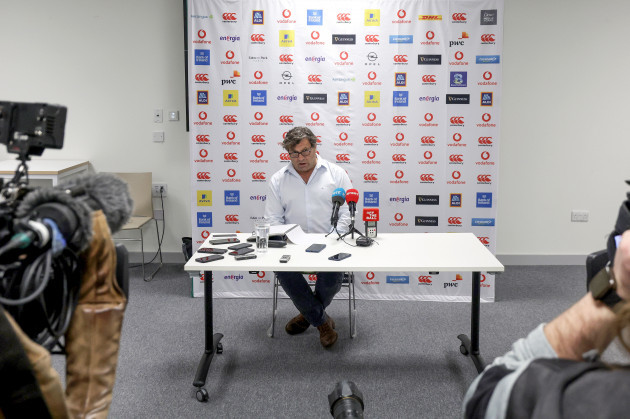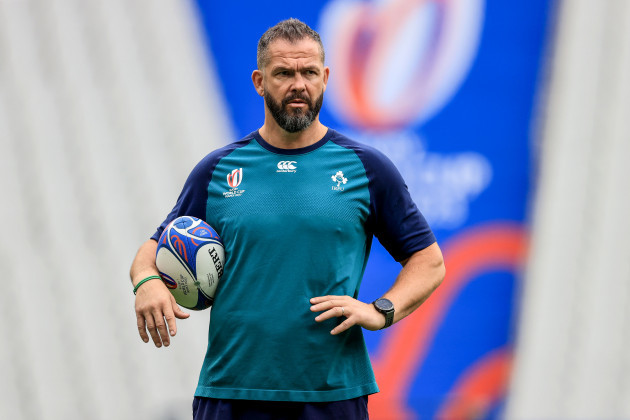WHAT A DIFFERENCE a World Cup cycle makes. In the winter of 2019, IRFU performance director David Nucifora sat down to share a rather grim World Cup review with the media.
Some of the feedback must have made the then-departed Joe Schmidt wince. As the men’s squad nursed the wounds of a harrowing 46-14 quarter-final defeat to New Zealand, Nucifora detailed issues around “performance anxiety”, underestimating pool opponents Japan and a failure to develop the gameplan. It was ugly stuff.
By comparison, yesterday’s annual press briefing with Nucifora may as well have been held at the bottom of a rainbow, the conference starting just minutes after the IRFU announced head coach Andy Farrell is staying put for the 2027 World Cup. Nice timing. Nucifora went as far to say Farrell can become “one of the all-time great coaches.”
The Wigan native remains hugely popular despite Ireland’s latest World Cup charge ending with yet another quarter-final defeat. For those hoping the IRFU’s 2023 World Cup review would cast some light on what went wrong in France, don’t hold your breath. While the review isn’t complete just yet, Nucifora ensured his audience it won’t be “an earth-shattering document.” Getting to the point nice and early as he warmed into a 40-minute briefing in Abbotstown, he told us “I don’t think there’s anything there that systematically will tell us why we didn’t win that game.”
Generally speaking, the provinces are in a good place and Irish Rugby continues to push through talented young players at an impressive rate. In truth, if you were to focus solely on the men’s 15s side of the game, there are few holes to pick at.
The same goes for Sevens Rugby, with both the Men’s and Women’s squads qualified to compete at the Paris Olympics next year, an event which will act as Nucifora’s swansong before vacating his office after a 10-year stint. Yesterday brought the surprise news the IRFU is set to select one contracted player from each of the provinces to join the Men’s Sevens squad for the Paris Games. It will be interesting to see how this develops and impacts the provinces in the months ahead, but Sevens has always been Nucifora’s baby, having totally transformed the programme since joining the IRFU.
When it comes to other areas of Irish Rugby, it’s a different story. His response to a question regarding the health of the club game won’t fill those invested in the AIL with confidence. The same goes for the Women’s 15s, who only received a short mention in Nucifora’s opening address. These two key areas of Irish Rugby should be high on the list of priorities when David Humphreys steps into the job next year.
Humphreys will be just the second person to hold the role, which was newly-created for Nucifora when he joined the IRFU in 2014. Ten years on, the men’s game appears in rude health even if that World Cup quarter-final barrier has remained impenetrable.
But in France, it felt different. Ireland went into the tournament as genuine contenders and while they ultimately fell short of their target, they didn’t return home with the same baggage as the squads of World Cups past.
The official review may not be signed and sealed just yet, but Nucifora is happy the players were provided with the best platform and preparation to achieve. Watching New Zealand race into a 13-0 lead at the Stade de France was damaging, but not a result of those dreaded “performance anxiety” issues which suffocated Schmidt’s squad in Tokyo.
“It wasn’t an issue,” Nucifora said. “I mean, it’s a game of rugby and you’ve got four teams at the moment in the world who I think on any given day could beat each other if you played them multiple times.
“There’s probably two instances in that game where the ball might have bounced differently or we might have made a different decision about a certain time we decided to do something, and that’s probably the difference between winning and losing that game.
So I certainly don’t relate that to performance anxiety in any way, shape or form. It’s a high-level international rugby match.”
Ireland didn’t receive much criticism during their time in France but two issues flagged throughout the tournament were again raised yesterday. Firstly, the suggestion fatigue played a part in Ireland’s exit against a New Zealand side who rotated their squad more freely throughout the pool stages.
Nucifora batted this theory away: “Sometimes, having that cohesion in your team and being able to get on a roll like that is really important as well.
“We certainly don’t look at that as a reason why we lost to New Zealand by a couple of points.”
Secondly, that Ireland paid the price for a lineout which Nucifora admitted lacked consistency: “I think it wasn’t a failure, as such, but I think the consistency of the lineout at times proved to be a bit of a challenge for us and we weren’t as consistent as we’d have liked to be.
I certainly think that, from having this discussion with Paul (O’Connell), the quality of lineout defence in the game is improving and that’s something he’s looking at really closely at the moment.
“As to how do you get ahead of that, it’s like the rest of the game – you get times in the game as it evolves that sometimes attack is miles ahead of defence and then the defensive side of the game catches up. Lineout defence at the moment across the game has improved and we’ve got to find a way to be able to improve our lineout attack to be able to get ahead of the game as well.”
Overall, Nucifora is confident there is no lingering emotional damage and that Farrell’s squad will be ready to compete again when the Six Nations rolls around in early February.
At that point, Nucifora will be preparing to start showing Humphreys the ropes ahead of their summer handover.
“I still remember sitting in the Aviva nine and a half, 10 years’ ago talking to you guys and we were ambitious, I was ambitious with what we could do,” Nucifora added.
“Now, we haven’t achieved everything and that’s disappointing that we haven’t been able to tick that World Cup piece; but there’s been lots of other achievements in there, from beating New Zealand to Grand Slams to the evolution of our pathways, the sustainability of the pathways that are in place.
We’re producing players now at such a rate that we’ve left a healthy system both provincially and internationally.
“Something that I’d be proud of is the mindset. Irish teams go on to the field now and they know they can beat anyone. That shift in mindset is something that’s super important for success going forward.
“We weren’t in that position 10 years ago when we hadn’t beaten New Zealand. Now, we’ve got players coming in and that’s what they expect. For me, that’s something that’s particularly important.”
********
Nucifora on:
The risk of squad unrest as a result of replacing long-serving Sevens players with players from the provinces for the Paris Olympics:
“Look, they know they’re in a competitive environment and we wanted to be able to see where we could supplement the squad and enhance it. We’ve got a very strong group, well capable of medalling as they stand now, but if we look at this and see there’s the ability to bring one, two or three players in because we feel that’s the right thing to do, we’ll do it because that group wants to win a medal and that’s what the country will want, for the squad to win a medal. They’re decisions that will be made in the best interests of the whole group.”
The importance and role of the AIL:
“The clubs will always be valuable to professional rugby. I mean, the number of players that we have playing AIL each week, we monitor closely.
“So it’s mainly our Academy players in the first couple of years that are soaking up time in the AIL and that’s incredibly valuable for their development, so we need that competition to remain as strong as it can be because they’re helping us to develop those players that are coming through our system.
“We’ve just got to make sure that the gap doesn’t get too big between where the professional game is moving and where the club game is. The big thing about the professional game now is the speed with which it moves and evolves and that’s hard for anyone to keep up with, the clubs included. So we’ve got to try to keep that gap at a reasonable rate so that those younger players benefit from playing club football.”
Bottlenecks of young talent at the provinces:
“It’s a good problem to have. It’s a challenge or a problem that we’ve created ourselves and now we’ve got to deal with that. We will be continuing with the likes of the Emerging Ireland scenario because it worked unbelievably well, not just for Irish rugby but for the players, it worked really well for our coaches on a number of fronts.
“I think it worked well with our provinces as well. Talking to the head coaches retrospectively, I know they weren’t all singing and dancing when we did it but if you look at Munster, for example, it was a turning point in their season, I believe.
“Sometimes the provincial coaches need to have other outlets to be able to let other people experiment because being a head coach is tough, they’re judged Saturday to Saturday to Saturday and sometimes they’re a little bit reticent to make calls that they might see as a little bit risky, whereas we stepped in with that concept and gave other people opportunities through a different platform, and it helped them.”





